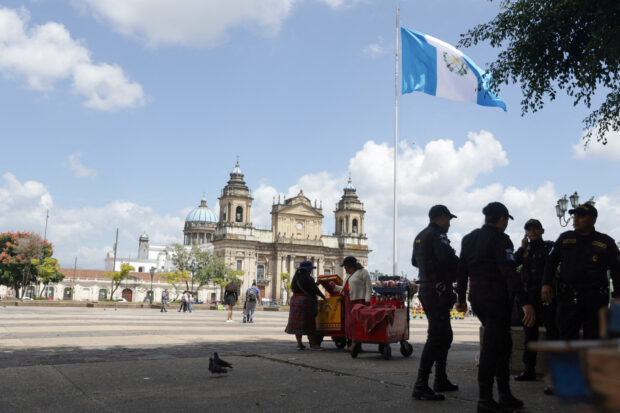Guatemalans vote for president as many hope for renewal of democracy

Police officers stand guard at the Constitucion square, ahead of Sunday’s presidential election, in Guatemala City, Guatemala August 19, 2023. REUTERS FILE PHOTO
GUATEMALA CITY — Guatemalans head to the polls Sunday to cast their vote in a presidential run-off election that many hope will reverse democratic backsliding under recent administrations.
Recent polls have predicted Bernardo Arevalo, a progressive candidate running on an anti-graft message, will trounce establishment figure and former first lady Sandra Torres. That outcome could usher in a new era after widespread allegations of corruption and creeping authoritarianism in recent years.
Guatemala’s new president will assume power as violence and food insecurity roil the country, triggering fresh waves of migration. Guatemalans now represent the largest number of Central Americans seeking to enter the United States.
The election is being closely watched by the international community, including the United States, after campaigning was marred by attempts by some officials to remove Arevalo and his Semilla party from the race.
His surprise second-place finish in June’s first-round vote provoked calls from opponents for recounts that delayed official results. His party was briefly suspended at the request of a prosecutor before the country’s top court reversed the ban.
Article continues after this advertisementThe political back-and-forth has put some voters on edge about potential problems during the run-off, which Arevalo has publicly said he is expecting.
Article continues after this advertisement“I hope that everything is calm, that democracy wins, that there is no fraud or political issues … and that our country gets ahead more than anything,” said Ardem Villagran, 58, a merchant in Guatemala City.
Outgoing President Alejandro Giammattei has vowed to ensure an orderly vote and transition of power.
But many Guatemalans remain skeptical, having seen the government in recent years expel investigators from a U.N.-backed anti-corruption body and target judges and anti-corruption campaigners, many of whom fled into exile.
The attorney general who called for Semilla’s suspension had been previously added by the U.S. State Department to its Engel List of “corrupt and undemocratic actors”.
The Organization of American States said a team of 86 election observers was in the country.
“It is essential that citizens be able to express themselves freely with full guarantees and that their expressions be respected,” said Eladio Loizaga, head of the OAS mission in Guatemala, on Saturday.
Polls will close at 6 p.m. local time (12 am GMT).
The president-elect should take office on Jan. 14, though experts warned that the months after the vote could see challenges to the result.
Policy Director Eric Olson of the Seattle International Foundation, which focuses on Central America, said the OAS and the U.S. see that as a risk.
“It’s a long time for there to be attempts at not only challenging the results, but the legality of the winning party,” Olson added.